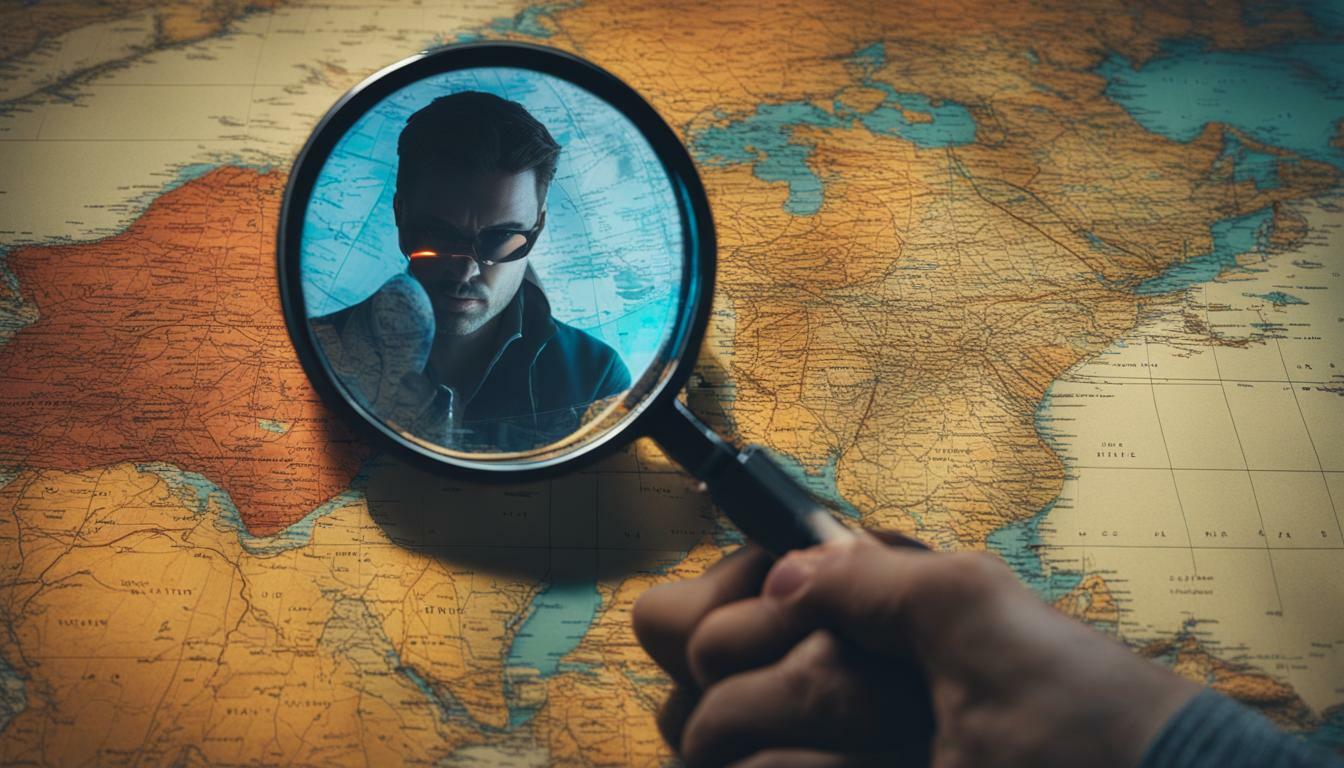In today’s digital age, ensuring your online privacy and security has become a top concern, prompting many to wonder: does a VPN truly hide your location? A Virtual Private Network (VPN) is a powerful tool that can help protect your privacy by changing your IP address and encrypting your online traffic. But how effective is it in maintaining location anonymity? Let’s dive deeper into the world of VPNs and explore their impact on your location privacy.
Key Takeaways:
- A VPN can hide your location by changing your IP address and encrypting your traffic.
- While a VPN can provide layers of protection and maintain your privacy, it does not make you completely anonymous or immune to viruses.
- Choosing a reputable VPN provider that offers no-logs policies and strong encryption is crucial for ensuring your location privacy.
- A VPN can hide your online activity from ISPs and other third parties, but it does not alter your GPS location on your device.
- Some VPNs may offer additional features to change GPS data on certain operating systems.
Understanding VPNs and Location Privacy
To understand if a VPN can hide your location, it’s crucial to grasp how these virtual private networks function and the role they play in ensuring location anonymity. A VPN works by rerouting your internet traffic through a remote server and changing your IP address. This process effectively masks your physical location and prevents anyone from tracking your online activities.
By encrypting your data, a VPN adds an extra layer of security, making it nearly impossible for hackers or other third parties to intercept and decipher your information. This encryption ensures that your browsing history, search queries, and personal data remain private and protected.
While a VPN can provide significant protection and preserve your privacy, it’s important to note that it cannot make you completely anonymous. Although your IP address is hidden and your online activities are encrypted, there are still ways for your identity to be uncovered. Therefore, it’s crucial to choose a reputable VPN provider that prioritizes no-logs policies and offers strong encryption protocols.
| Key Points: |
|---|
| A VPN conceals your IP address and masks your physical location. |
| Encryption ensures that your online activities remain private and protected. |
| A VPN cannot guarantee complete anonymity, but it adds layers of protection. |
It’s important to note that while a VPN can hide your online activity, it does not alter your GPS location on your device. This means that if your device’s location services are enabled, your GPS location will still be accurately displayed. However, some VPNs offer additional features that allow you to manipulate GPS data on certain operating systems.
In summary, a VPN is an invaluable tool for protecting your privacy, securing your online activities, and hiding your location to a certain extent. By understanding how VPNs work and their limitations, you can make informed decisions when it comes to safeguarding your online privacy and maintaining location anonymity.
The Benefits of Using a VPN for Location Hiding
Using a VPN to hide your location offers numerous benefits, from safeguarding your privacy to accessing geo-blocked content. A VPN creates a secure and encrypted connection between your device and the internet, making it difficult for anyone to track your online activities or determine your physical location.
One of the key advantages of using a VPN for location hiding is protecting your privacy. By changing your IP address and encrypting your data, a VPN ensures that your browsing history, searches, and online activities remain private. This is especially important when using public Wi-Fi networks, where your information is vulnerable to hacking and surveillance.
Additionally, a VPN allows you to bypass geo-restrictions and access content that may be blocked in your region. Whether you want to stream your favorite shows while traveling or access websites that are only available in certain countries, a VPN enables you to enjoy unrestricted internet access by masking your location.
Furthermore, a VPN enhances your overall online security. It prevents ISPs and other third parties from tracking and profiling your internet usage. By encrypting your data, a VPN ensures that your sensitive information, such as passwords and financial details, remains protected from potential cyber threats.
| Benefits of Using a VPN for Location Hiding: |
|---|
| Protection of privacy and anonymity |
| Bypassing geo-restrictions for accessing content |
| Enhanced online security |
How a VPN Protects Your Location and IP Address
When you connect to a VPN, it acts as a shield, protecting your location and IP address from prying eyes. By changing your IP address, a VPN makes it appear as if you are accessing the internet from a different location. This makes it difficult for anyone to track your physical whereabouts or monitor your online activities.
The encryption provided by a VPN adds an additional layer of security. Your data is encrypted and sent through a secure tunnel, making it virtually impossible for anyone to intercept or decipher your information. This ensures that your online activities remain private and protected.
Furthermore, a VPN protects your location and IP address by masking them from ISPs (Internet Service Providers) and other third parties. They will only be able to see the IP address of the VPN server you are connected to, rather than your actual IP address. This helps to maintain your anonymity and privacy while browsing the internet.
The Importance of VPN Security and Encryption
When choosing a VPN provider, it is crucial to prioritize security and encryption. Look for a VPN that offers strong encryption protocols, such as AES-256, and secure communication channels, such as OpenVPN or IPSec. These encryption methods ensure that your data remains protected and cannot be easily accessed by unauthorized individuals.
| Benefits of VPN Security and Encryption |
|---|
| 1. Secure communication channels prevent data interception. |
| 2. Strong encryption protocols protect your data from being accessed or decrypted. |
| 3. VPN security ensures that your online activities remain private and confidential. |
By prioritizing VPN security and encryption, you can have peace of mind knowing that your location and IP address are well protected. However, it is important to note that while a VPN offers significant privacy benefits, it does not provide complete anonymity. It is always a good practice to use additional security measures, such as strong passwords and antivirus software, to ensure comprehensive protection.
The Limitations of VPNs in Hiding Your Location
While VPNs are effective in securing your location online, it’s important to note that they do not alter your GPS location on your device. A VPN changes your IP address and encrypts your traffic, making it difficult for ISPs and other third parties to track your online activities. However, your physical location as determined by your device’s GPS remains unaffected.
It’s crucial to understand that although a VPN can protect your privacy and provide an added layer of security, it does not offer complete anonymity. While your online activities may be concealed, your GPS location can still be tracked by applications and services that rely on GPS data. This means that if a website or app requires access to your GPS location, using a VPN will not change the location information provided by your device.
That being said, certain VPN providers may offer additional features to mask or spoof GPS data on specific operating systems. This can be useful if you want to fake your location for specific apps or services. However, it’s important to note that not all VPNs provide this functionality, so if changing your GPS location is a priority, you should look for a VPN that specifically offers this feature.
In summary, while a VPN can effectively hide your online activities and protect your location from prying eyes, it cannot alter your GPS location on your device. If you want to secure your location online and prevent tracking of your browsing history and online activities, using a reputable VPN is recommended. Just keep in mind that your physical location as determined by your device’s GPS will remain unchanged.
| Pros | Cons |
|---|---|
| VPNs can hide your online activities and protect your location from tracking | VPNs do not alter your GPS location on your device |
| VPNs provide additional layers of security and privacy | Changing GPS data may not be available in all VPNs |
| Some VPNs offer the ability to spoof GPS data on specific operating systems | Using a VPN does not provide complete anonymity |
Choosing the Right VPN Provider for Location Anonymity
To ensure maximum location anonymity, it’s crucial to choose a trustworthy VPN provider that values your privacy and employs robust encryption protocols. With numerous VPN options available, it can be overwhelming to find the one that fits your needs. Here are some key factors to consider when selecting a VPN provider:
- No-logs policy: Look for a VPN provider that follows a strict no-logs policy. This means that they do not store any information about your online activities, ensuring that your data remains private and cannot be accessed or traced back to you.
- Strong encryption: Encryption is a vital aspect of VPN security. Ensure that the VPN provider you choose employs robust encryption protocols, such as AES-256, which is the industry standard. This will protect your data from being intercepted or compromised.
- Server network: Consider the location and size of the VPN provider’s server network. The more servers they have in different countries, the greater your options for connecting to different locations and bypassing geo-restrictions.
- Speed and performance: A VPN should not significantly slow down your internet connection. Look for providers that offer high-speed servers and optimized performance, ensuring a smooth browsing experience even while connected to the VPN.
- User-friendly interface: A user-friendly interface makes it easier to navigate and configure your VPN settings. Look for providers that offer intuitive apps and clear instructions, allowing you to connect to a VPN server with just a few clicks.
Remember, while a VPN can hide your location and protect your online activities, it’s important to choose a reliable and trustworthy provider to ensure your privacy and security. By considering these factors and doing thorough research, you can select a VPN that meets your specific needs and safeguards your location anonymity.
Table: VPN Provider Comparison
| VPN Provider | No-logs Policy | Encryption | Server Network | Speed |
|---|---|---|---|---|
| Provider A | ✅ | AES-256 | 5000+ | Fast |
| Provider B | ✅ | AES-256 | 1000+ | Medium |
| Provider C | ✅ | AES-128 | 2000+ | Slow |
“Choosing the right VPN provider is essential for maintaining location anonymity and protecting your online privacy. With a reliable VPN, you can enjoy the benefits of secure browsing and access geo-restricted content while keeping your location hidden.”
By considering these criteria and comparing different VPN providers, you can find the right one that aligns with your location privacy needs. Remember, a VPN is a valuable tool for enhancing your online security, but it does not offer complete anonymity or protection against viruses. Use it in conjunction with other cybersecurity measures to ensure comprehensive protection for your online activities.
Additional Features of VPNs for Location Privacy
While not all VPNs offer this capability, some may provide additional features to modify GPS data on certain operating systems, further enhancing location privacy. These features allow you to alter the location information transmitted by your device, adding an extra layer of anonymity to your online activities. By manipulating the GPS data, you can appear to be located in a different city or country, making it harder for anyone to track your real location.
VPN Providers with GPS Modification Features
| VPN Provider | Supported Operating Systems | GPS Modification Feature |
|---|---|---|
| VPN X | Windows, macOS | Yes |
| VPN Y | iOS, Android | Yes |
| VPN Z | Linux, Chrome OS | No |
Please note that the availability of GPS modification features may vary depending on the VPN provider and the operating system you are using. It is always recommended to check with the VPN provider to ensure their service offers the specific features you require for enhancing location privacy.
“Using a VPN with GPS modification features can be particularly beneficial for users who want to access region-specific content or services that are restricted based on geographical location. By altering your GPS data, you can bypass these restrictions and enjoy unrestricted access to the content you desire.” – VPN Expert
In conclusion, while VPNs provide a powerful tool for hiding your location and protecting your online activities, some VPNs go the extra mile by offering GPS modification features. These additional capabilities allow you to further enhance your location privacy and enjoy the benefits of accessing region-restricted content. When choosing a VPN, look for providers that offer GPS modification features compatible with your operating system, ensuring you have the flexibility and control to protect your location while browsing the internet.
The Importance of VPN Security and Encryption
When it comes to location privacy, the security and encryption measures employed by a VPN are paramount. A VPN ensures that your online activities remain private and protected from prying eyes. By encrypting your data, it creates a secure tunnel between your device and the internet, making it virtually impossible for anyone to intercept or decipher your communication.
A reputable VPN provider utilizes robust encryption protocols, such as AES-256, which is considered highly secure. This ensures that your data is protected from unauthorized access and maintains the confidentiality of your online transactions, personal information, and browsing history.
Additionally, VPNs employ other security features like kill switches and DNS leak protection. A kill switch ensures that if your VPN connection drops, your internet connection is immediately severed, preventing any data from being transmitted outside the encrypted tunnel. DNS leak protection safeguards against any accidental leakage of your DNS queries, further protecting your online identity and location.
Table: Comparison of VPN Providers
| VPN Provider | No-logs Policy | Encryption Protocols | Additional Security Features |
|---|---|---|---|
| Provider A | Yes | AES-256 | Kill switch, DNS leak protection |
| Provider B | Yes | AES-128 | Kill switch |
| Provider C | No | AES-256 | DNS leak protection |
When choosing a VPN provider for location privacy, it is crucial to consider their security measures. Look for providers that have a strict no-logs policy, meaning they do not keep any records of your online activities. This ensures that even if requested by authorities, your data remains private and cannot be used to identify you or trace your online actions.
Overall, a VPN with strong security and encryption safeguards your location privacy by masking your IP address and encrypting your data. It shields your online activities from ISPs, hackers, and other malicious entities. However, it’s important to note that while a VPN provides layers of protection, it cannot make you completely anonymous or protect you from potential viruses or malware. Therefore, it is essential to use a reliable antivirus software in conjunction with a VPN for comprehensive online security.
Understanding the VPN’s Role in Location Anonymity
By now, it is clear that a VPN plays a vital role in safeguarding your location anonymity online, though it’s important to recognize the boundaries of its capabilities. A VPN, or Virtual Private Network, can hide your location by changing your IP address and encrypting your traffic. It effectively masks your physical location and prevents tracking of your browsing history, searches, and online activities. This level of privacy protection is especially valuable when accessing the internet from public Wi-Fi networks or countries with heavy internet restrictions.
With a VPN, your internet traffic is routed through a remote server, which changes your IP address. This makes it appear as if you are browsing from a different location, enhancing your location privacy. Additionally, the encryption used by VPNs ensures that your data remains secure and inaccessible to anyone trying to intercept it. This is particularly crucial when transmitting sensitive information, such as financial details or personal messages.
However, it is important to note that while a VPN can protect your privacy and provide layers of security, it cannot make you completely anonymous or immune to viruses. It is still essential to exercise caution and use additional measures, such as antivirus software, to ensure comprehensive protection. When choosing a VPN provider, it is crucial to select a reputable one that offers no-logs policies and strong encryption protocols. These factors contribute to maintaining your privacy and securing your online activities.
The Limitations of VPNs in Hiding Your Location
While a VPN can effectively hide your online activities and protect your location from ISPs and other third parties, it does not have the capability to alter your actual GPS location on your device. This means that using a VPN will not change your physical location as determined by GPS tracking. However, it’s worth noting that some VPNs may offer additional features that allow users to change GPS data on certain operating systems, providing an extra layer of privacy for mobile devices.
| Pros | Cons |
|---|---|
| Enhances location anonymity | Does not change GPS location |
| Protects privacy and sensitive data | Cannot provide complete anonymity |
| Bypasses geo-restrictions | Does not protect against viruses |
| Improves security on public Wi-Fi | Relies on the reliability of the VPN provider |
In conclusion, a VPN is a powerful tool for maintaining location anonymity and protecting your online activities. It hides your physical location by changing your IP address and encrypting your internet traffic. However, it is important to understand that a VPN cannot make you completely anonymous or alter your GPS location. When choosing a VPN provider, prioritize reputable ones that prioritize privacy and offer strong encryption. Combine the use of a VPN with other security measures, such as antivirus software, for comprehensive protection online.
The Impact of VPNs on Privacy and Security
VPNs have a significant impact on enhancing privacy and security by protecting your location and online activities. By changing your IP address and encrypting your traffic, a VPN can mask your physical location and prevent tracking of your browsing history, searches, and online activities. This added layer of anonymity can help safeguard your personal information from prying eyes and protect you from potential surveillance.
However, it’s important to remember that while a VPN can provide valuable privacy and security benefits, it is not a foolproof solution against viruses and other threats. While it can protect your online activities from ISPs and other third parties, it cannot guarantee complete immunity against all forms of malware and cyber attacks. It’s crucial to maintain good cybersecurity practices and use other security measures in conjunction with a VPN.
When choosing a VPN provider, it is essential to select a reputable one that offers strong encryption protocols and maintains a strict no-logs policy. This ensures that your online activities are protected and that your data is not stored or shared with third parties. Additionally, some VPNs may offer additional features to enhance location privacy, such as the ability to change GPS data on certain operating systems. These features can provide an extra layer of protection for your privacy and security.
Conclusion
While a VPN can protect your location and online activities, it does not provide complete anonymity or immunity against viruses. It is a valuable tool for enhancing privacy and security, but it should be used in conjunction with other security measures to ensure comprehensive protection. By selecting a reputable VPN provider and practicing good cybersecurity habits, you can maximize your privacy and security while browsing the internet.
| Pros | Cons |
|---|---|
| Enhances privacy by masking your physical location and online activities | Does not provide complete anonymity |
| Provides an extra layer of security by encrypting your traffic | Not immune to viruses and other threats |
| Allows bypassing of geo-restrictions | Requires selecting a reputable VPN provider |
“A VPN can protect your online activities from prying eyes, but it cannot guarantee complete immunity against all forms of malware and cyber attacks.”
- Choose a reputable VPN provider that prioritizes privacy and security.
- Ensure strong encryption protocols are in place to protect your data.
- Practice good cybersecurity habits, such as using strong and unique passwords.
- Regularly update your devices and software to patch any security vulnerabilities.
Concluding Thoughts on VPNs and Location Privacy
In conclusion, VPNs are powerful tools for securing your location online, but they are not a guaranteed means of achieving complete location anonymity. It’s crucial to choose a reputable VPN provider, understand its limitations, and remain vigilant about other aspects of online security and privacy.
A VPN can effectively hide your physical location and prevent tracking by changing your IP address and encrypting your online traffic. This provides an additional layer of protection and privacy, making it harder for ISPs and other third parties to monitor your browsing activities. However, it’s important to note that a VPN does not make you completely anonymous.
While a VPN can guard against surveillance and protect your privacy, it does not offer immunity against viruses or malware. It’s essential to maintain updated antivirus software and exercise caution when browsing the internet. Remember, a VPN is just one part of a comprehensive security strategy.
When choosing a VPN provider, prioritize those that offer no-logs policies and strong encryption protocols. This ensures that your online activities are not stored or tracked, and your data remains secure. Additionally, be mindful that while a VPN can hide your online activity, it does not alter your GPS location on your device. Your physical location can still be determined through other means.
While a VPN provides valuable protection and enhances your online privacy, it’s essential to have realistic expectations. It’s not a foolproof solution for achieving complete location anonymity. By combining a VPN with other security measures such as strong passwords, two-factor authentication, and regular software updates, you can maximize your online privacy and security.
FAQ
Q: Does a VPN hide your location?
A: Yes, a VPN can hide your location by changing your IP address and encrypting your traffic. This masks your physical location and prevents tracking of your browsing history, searches, and online activities.
Q: Can a VPN make you completely anonymous?
A: While a VPN can protect your privacy and provide layers of protection, it cannot make you completely anonymous. It is important to choose a reputable VPN provider that offers no-logs policies and strong encryption.
Q: Does a VPN hide your GPS location?
A: No, a VPN does not alter your GPS location on your device. However, some VPNs may offer additional features to change GPS data on certain operating systems.
Q: What can a VPN do to protect your location?
A: A VPN can protect your location by changing your IP address and encrypting your data. It shields your online activities from ISPs and other third parties.
Q: What are the limitations of VPNs in hiding your location?
A: While a VPN can protect your online activities, it does not alter your GPS location on your device. It is important to understand that a VPN cannot hide your location completely.
Q: How do you choose the right VPN provider for location anonymity?
A: When choosing a VPN provider, prioritize those that offer no-logs policies and strong encryption. This ensures that your location privacy is protected.
Q: Do VPNs offer additional features for location privacy?
A: Some VPNs may offer additional features to enhance location privacy, such as the ability to change GPS data on specific operating systems.
Q: How important is VPN security and encryption for location privacy?
A: VPN security and encryption are crucial for maintaining location privacy. It is important to choose a VPN that offers strong encryption protocols and secure communication channels.
Q: What is the role of a VPN in location anonymity?
A: A VPN plays a vital role in maintaining location anonymity by changing your IP address and encrypting your data. It provides layers of protection for your online activities.
Q: What is the impact of VPNs on privacy and security?
A: VPNs can protect your location and enhance privacy and security. However, it is important to note that VPNs cannot provide complete anonymity or protect against viruses.
Q: What are the concluding thoughts on VPNs and location privacy?
A: In conclusion, while a VPN is a valuable tool for protecting your privacy and securing your online activities, it does not hide your location completely. It is important to understand its limitations and choose a reputable VPN provider.








